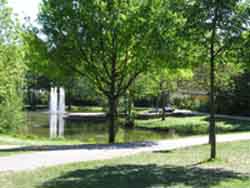Schweinfurt: Difference between revisions
Heike.kaiser (talk | contribs) mNo edit summary |
Markus Peter (talk | contribs) No edit summary |
||
| Line 33: | Line 33: | ||
=== Author's perspective === | === Author's perspective === | ||
* The influence of landscape architecture into the revitalisation of old towns | * The influence of landscape architecture into the revitalisation of old towns, their abilities and limitations. | ||
=== Landscape and/or urban context=== | === Landscape and/or urban context=== | ||
*Biogeography, cultural features, overall character, history and dynamics | *Biogeography, cultural features, overall character, history and dynamics | ||
Illustration: | Illustration: | ||
| Line 42: | Line 43: | ||
=== Cultural/social/political context=== | === Cultural/social/political context=== | ||
*Brief explanation of culture, political economy, legal framework | *Brief explanation of culture, political economy, legal framework | ||
Schweinfurt is a town with about 55.000 inhabitants, located at the river Main and is a city of the industry and art | |||
It has a historical old part of town | |||
Schweinfurt has a very huge impact on metal industry, especially ball bearings industry. | |||
The colour Schweinfurt green which was very popular in the 19t.th century was also invented and produced there. Unfortunately this pigment contains very huge cocentrations of heavy metal, especially arsenic. | |||
Various depots of this substance can be found throughout the city and their parks. | |||
Illustration: | Illustration: | ||
| Line 48: | Line 55: | ||
=== History === | === History === | ||
*How did the area/project/plan at the focus of the case study evolve? | *How did the area/project/plan at the focus of the case study evolve? | ||
Illustration: Table or time line | Illustration: Table or time line | ||
Revision as of 19:00, 23 November 2008
The creation of a green belt as an impulse for urban regeneration in Schweinfurt (Germany)
Rationale: Why is this case study interesting?
- The case study shows the ability of the revitalisation of a city as a co-operation of old town renewal and the creation of a green belt
- Old towns are very typical for european cities. Nowadays they lack in a population movement from within towns and cities to the rural-urban fringe. This project shows how old towns can be strenghtened
Author's perspective
- The influence of landscape architecture into the revitalisation of old towns, their abilities and limitations.
Landscape and/or urban context
- Biogeography, cultural features, overall character, history and dynamics
Illustration:
Map; sketches; short descriptive analyses
Cultural/social/political context
- Brief explanation of culture, political economy, legal framework
Schweinfurt is a town with about 55.000 inhabitants, located at the river Main and is a city of the industry and art It has a historical old part of town Schweinfurt has a very huge impact on metal industry, especially ball bearings industry. The colour Schweinfurt green which was very popular in the 19t.th century was also invented and produced there. Unfortunately this pigment contains very huge cocentrations of heavy metal, especially arsenic. Various depots of this substance can be found throughout the city and their parks.
Illustration:
Bullet points, image, background notes
History
- How did the area/project/plan at the focus of the case study evolve?
Illustration: Table or time line
Spatial analysis of area/project/plan
- What are the main structural features?
- How has it been shaped? Were there any critical decisions?
Illustration: Map/diagram/sketches photos and background notes
Analysis of program/function
- What are the main functional characteristics?
- How have they been expressed or incorporated?
Illustration: Map/diagram/sketches photos and background notes
Analysis of design/planning process
- How was the area/project/plan formulated and implemented?
- Were there any important consultations/collaborations?
Illustration: Map/diagram/sketches photos and background notes
Analysis of use/users
- How is the area/project/plan used and by whom?
- Is the use changing? Are there any issues?
Illustration: Map/diagram/sketches photos and background notes
Future development directions
- How is the area/project/plan evolving?
- Are there any future goals?
Illustration: Map/diagram/sketches photos and background notes
Peer reviews or critique
- Has the area/ project/plan been reviewed by academic or professional reviewers?
- What were their main evaluations?
Pleas add references, quotes...
Points of success and limitations
- What do you see as the main points of success and limitations of the area/project/plan?
Illustration: Summary table
What can be generalized from this case study?
- Are there any important theoretical insights?
Short statement plus background notes
Which research questions does it generate?
Short statement plus background notes
Image Gallery
- Yourimage.jpg
your image text
- Yourimage.jpg
your image text
- Yourimage.jpg
your image text
- Yourimage.jpg
your image text
- Yourimage.jpg
your image text
- Yourimage.jpg
your image text
- Yourimage.jpg
your image text
- Yourimage.jpg
your image text
- Yourimage.jpg
your image text
- Yourimage.jpg
your image text
References
Please add literature, documentations and weblinks
[[Category:Schweinfurt] About categories: You can add more categories by copying the tag and filling in your additional categories
